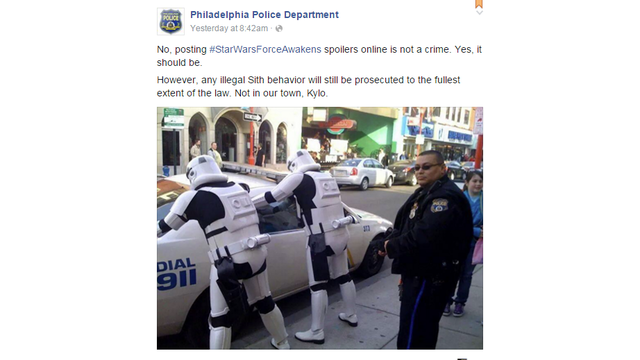The release last week of Avengers: Endgame brought about the rarest of events on the internet: silence. Few posted, fewer described, and almost no one traded opinions out loud about the MCU’s crowning achievement. Fear of giving away information about the fates of major characters in the film, i.e., the act of ‘spoiling,’ managed to do that which even governments have trouble achieving, namely silencing social media. The benefits of an information embargo are clear – suspense is vital to storytelling. Giving up the ending denudes the climax of its emotional intensity. But have we considered the drawbacks of the eerie silence that descended on our news feeds last Friday? This obsession with censoring our responses to mass culture threatens our ability to evaluate and enjoy these experiences. Here are some reasons why:
Leakers are Trying to Help You Enjoy the Movie
Spoilers enhance the viewing experience. Just like someone who reads the last page of a novel first, a person who has advance knowledge of a film’s ending is free to focus on a more thorough reading of the story. That I know in advance that [redacted] lives or dies means that I no longer need to expend energy anticipating that character’s fate. I have processed it and, with it, the film’s intent. I can watch for other rewarding things, such as foreshadowing, symbolism, and other details. Action sequences can wash over me rather than worrying if I missed something. I can truly enjoy the facial ticks and other facets of Robert Downey’s Jr’s performance as Tony Stark. Not to mention the fact that leaving the theater for the even briefest of bathroom breaks is no longer an act of self-sabotage.
A 2011 study by psychologists at UC San Diego confirms these assumptions. The study found that those with advance knowledge of an ending enjoyed the story more than those who did not know the ending. Or, why would anyone ever watch a movie more than once? I have seen Fight Club multiple times, and I enjoy it more with each viewing, even though I know that [redacted] and [redacted] are the same [redacted]. Because every time I watch it, I find something new to appreciate. Just as I do Sixth Sense, even though somebody standing in front of me in line to see a different film at a Boston theater in 1999 turned to a friend and loudly announced that Bruce Willis was a [redacted]. The line groaned. But really, I owe that person a favor. He freed me up to notice from early on the symbolic power of the color red in the film.
Blabbermouths are Just Being Good Citizens
The free flow of information is vital to civil society, even if that information makes us uncomfortable or challenges our worldview. As a middle-class resident of a metropolitan area, I may not want to have to deal with the fact of rural poverty. And yet, I ignore that information at my peril. Neglected long enough, poverty is expensive to all of us, it breeds division and discontent, and it can upend institutions. Likewise, I may not want to know about Endgame that [redacted] or [redacted]. But not knowing is not necessarily in my best interest, either.
What if that information conveys content that I’ve already seen in another form, that I consider to be in bad taste, or that sounds boring or anti-climactic? Why would I want to go to a movie where [redacted] happens? In this way, spoiling is the same as recommending or not recommending a brand of coffee maker. Knowing in advance can be unpleasant, but it provides a balance of information that makes us better citizens and consumers.
The value of leaking is that it reminds us that there are limits to the role of consent in civil society. We’re upset about leaks because we did not give authorization to have that knowledge in our news feeds. But there are different forms of consent, some forms of which are involuntary.
There are lots of things that appear in my news feed that I do not need or want to see. For instance, baseball scores before I’ve watched the game, as well as opinions, violence, or unfortunate deaths. Yes, even the endings of television shows and films. That is the price I pay to join social media. And, it is not as if social media is forcing me to look at that information. I can delete my account. I can unfollow/mute a person of a group chat, scroll past it, or I can simply not log on to that site on that day.
There are forms of knowledge that need to be censored, of course, such as speech that incites violence or hate. But it should be clear to us all that giving away the end of a movie is not hate speech. And, if we begin to treat it as such, we wind up losing all forms of consent to media platforms, lawyers, and bullies. Reddit briefly bans leakers for disruptive behavior, AMC issued a cease-and-desist letter to The Spoiling Dead Fans to prevent speculation about an upcoming episode, and a mob of angry filmgoers recently beat up a Hong Kong man for giving away the details of Endgame. I don’t care how much you care about the characters. No film is worth the price of mob violence.

Giving Away the Ending Fights Corporate Greed
Because, in the end, the only community that truly benefits from anti-spoiler campaigns is Big Hollywood. If we’re honest, we would have to admit that our sudden rush of concern with spoilers and leaks has been prompted by the same public relations juggernaut that has managed to turn these movies into global events. Jokes about Mark Ruffalo’s or Tom Holland’s penchant for blabbering are about more than gentle teasing – they are part of a subtle media campaign to encourage self-censorship.
Disney doesn’t want you to let out information about Endgame for several reasons. One motivation is that it could discourage people from seeing the film. But I doubt many people turned away from Infinity War because they accidentally found out that [redacted] or [redacted] [redacted]. And, if they did, it is hardly time to sell your shares of Disney. That film made two billion dollars. Endgame had a 1.2 billion dollar opening weekend. I find it interesting that we only really care about spoilers when the stakes involve unimaginable sums of someone else’s money. To date, no one has warned me not to reveal the end of Little or Five Feet Apart.
But there may be other reasons why Disney is discouraging spoilers. To bring it back to my original point, perhaps they don’t want you free to focus on the film’s subtleties. The MCU is a wonderful place, but nuance is hardly a word that we use to describe it. Knowing the end of Endgame might allow you to better discern its flaws. Best you be distracted by the anticipation of an explosive ending than be free to parse what could be thin dialogue or predictable characters. In this sense, we return again to the idea that spoilers are a quasi-film review – knowing the ending allows you to evaluate the film you are about to see. It protects your rights as a consumer, just as popular knowledge that Crystal Pepsi tasted nasty.
So, don’t get mad the next time someone spoils the end of a movie like Endgame. They are helping you to better evaluate and enjoy your experience with mass culture. We need them. Even if we don’t want them.
[There are no spoilers in this essay. The author has yet to see Avengers: Endgame. He has heard that it is excellent, though.]


![[NEWS] A MOST RARE VISION: DIGITAL THEATER GROUP ‘A STAGE REBORN’ BRINGS SHAKESPEARE TO EORZEA](https://geekd-out.com/wp-content/uploads/2019/09/FFXIV-2-150x150.png)
